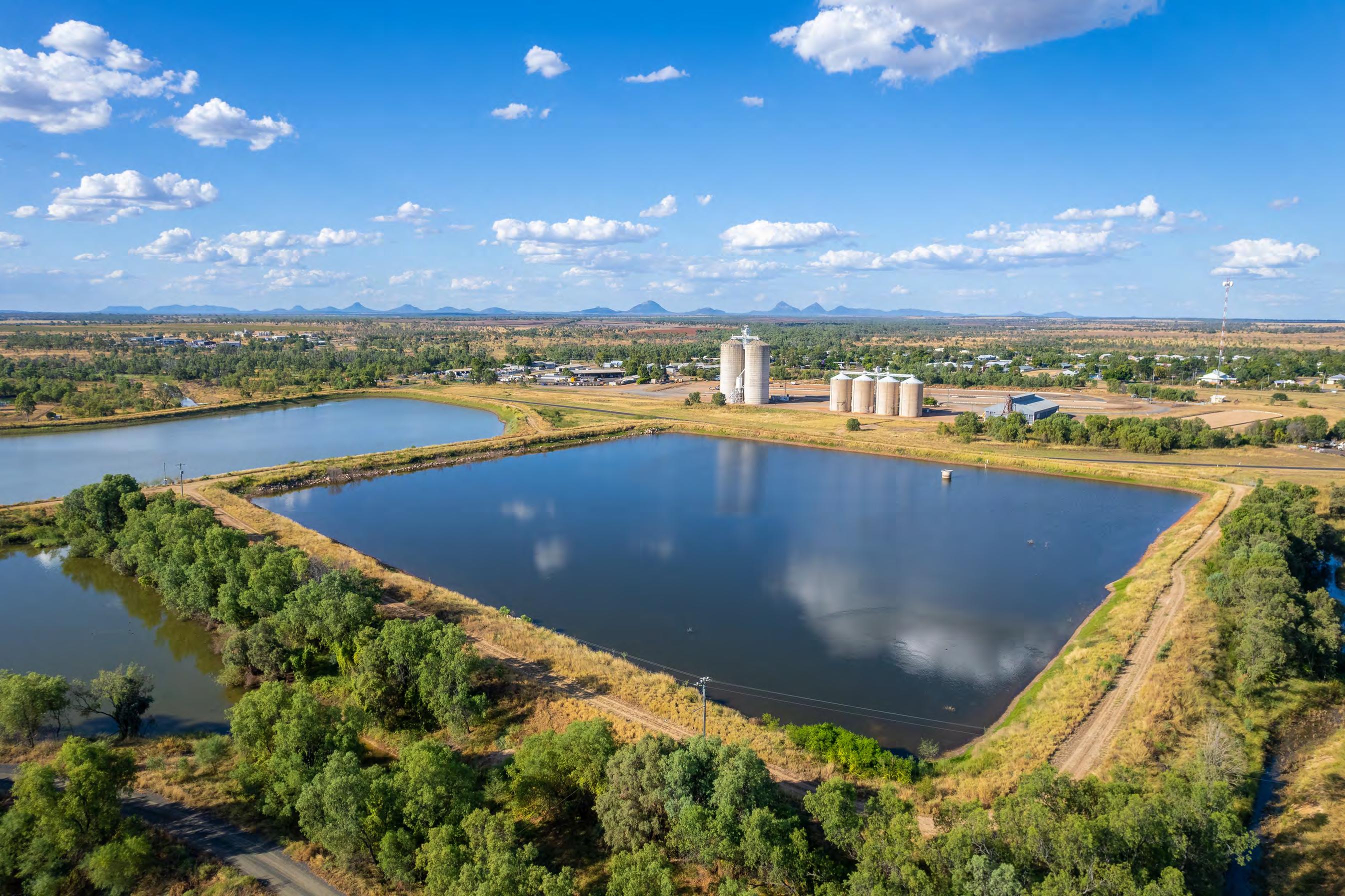



Yam (1999) by Micheal Nelson

Jagamara AM, acrylic on linen. Purchased by Emerald Shire Council in the early 2000's.






Yam (1999) by Micheal Nelson

Jagamara AM, acrylic on linen. Purchased by Emerald Shire Council in the early 2000's.

Central Highlands Regional Council acknowledge the First Peoples – the Traditional Owners of the lands where we live and work, and we recognise their continuing connection to land, water and community.
We pay respect to Elders – past, present and emerging – and acknowledge the important role Aboriginal Peoples and Torres Strait Islanders continue to play within the Central Highlands region.
All council offices are open from 8.30 am to 5.00 pm Monday to Friday.
1300 242 686 (including after hours) enquiries@chrc.qld.gov.au www.chrc.qld.gov.au
Corner of Egerton and Borilla Streets, Emerald
10 Mackenzie Street, Blackwater
4 Conran Street, Capella
12 William Street, Duaringa
29 Eclipse Street, Springsure
Transaction Centres
17 Warrijo Street, Rolleston (9.00 am to 12.30 pm and 1.00 pm to 4.30 pm)
Corner Grasstree and Anncrouye Street, Tieri (9.00 am to 1.00 pm and 2.00 pm to 5.00 pm)
www.chrc.qld.gov.au
The Central Highlands Regional Council 2023-2024 Operational Plan outlines council’s projects, strategies, services and advocacy planned for the next 12 months. The work included in the operational plan contributes to achieving the 7 long-term destination goals outlined in council’s overarching 5-year corporate plan.
Council’s $292.4 million budget for 2023-2024 ensures core services are delivered with high quality, are cost-effective and that new projects are appropriately funded.
As we move into another year, council, like all businesses, is operating in an environment of high inflation and shortages of labour, materials, and suppliers. Council will focus over the next year on appropriately resourcing our large delivery program and considering financial, cyber, safety and climate change challenges, ensuring we can undertake our work in a way that is safe, achievable, and responsible whilst planning for the future.
On top of our large capital works program, some of the key projects outlined in the operational plan include:
Our community visioning project ‘Your Region Your Vision.’ Community education on flood risks and emergency actions
Renewal of the Central Highlands Economic Master Plan



Volunteer recognition walks in our parks
Essential desludging works in our wastewater facilities
Redesigning our council website with a greater focus on usability and accessibility for our community.
This year’s council budget, operational plan and capital program carefully balance the expectations of our communities, the region’s progress and our responsibility to remain financially sustainable into the long term.
Council is proud of the services we provide to our community and look forward to our continued engagement and making our contribution to the liveability of the Central Highlands.
SHARON Houlihan Chief Executive Officer Kerry Hayes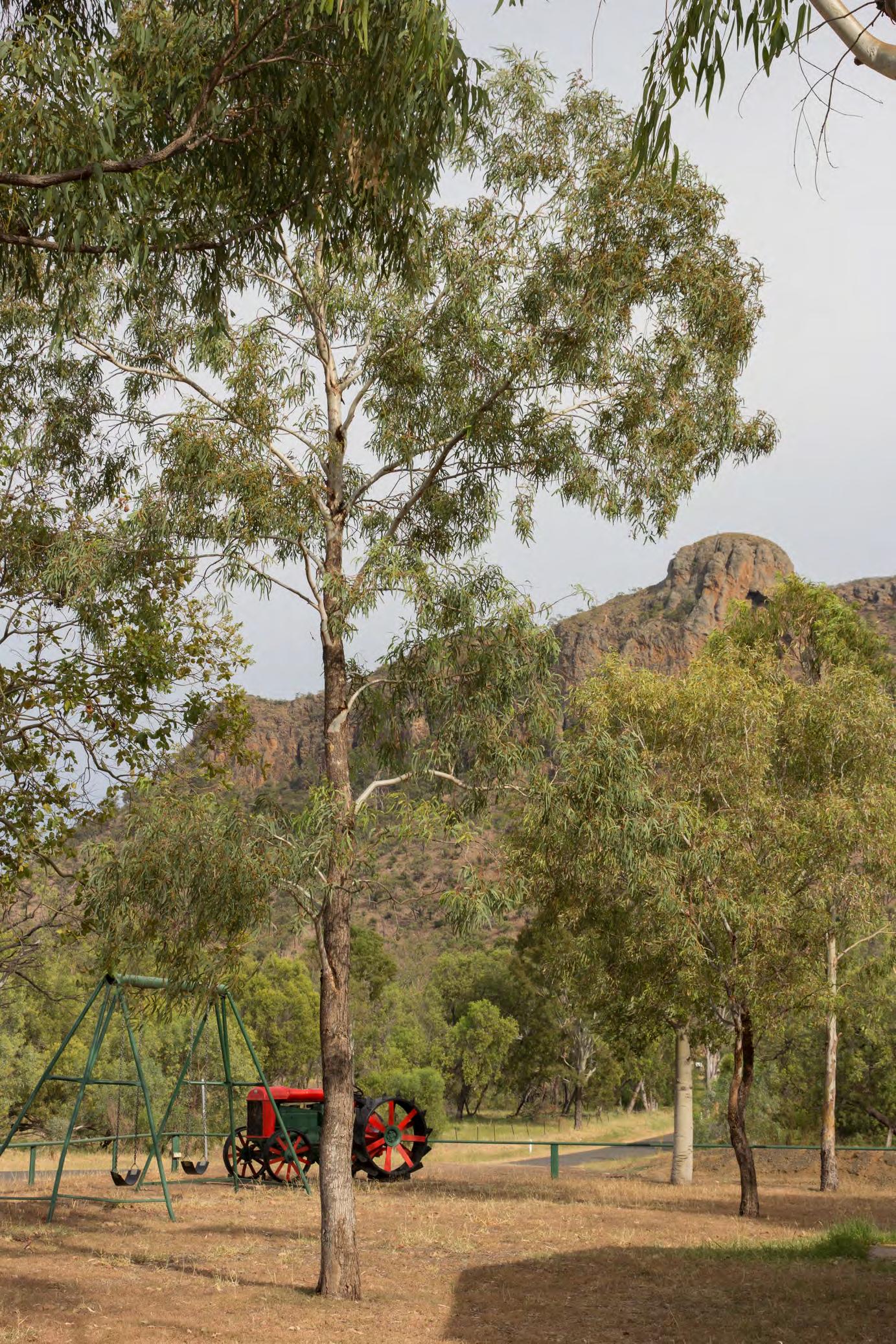
The Central Highlands region is in Central Queensland, Australia — considered a gateway to the outback. The region’s central business area, Emerald, is a threehour drive from Rockhampton on the coast and nearly 900 kilometres from Brisbane.
The region is huge, approximately 60,000 square kilometres, which is likened to the size of Tasmania. It stretches from the Arcadia Valley in the south to the Peak Ranges in the north, east from Boolburra to Bogantungan in the west.
Around 29,000 people call the Central Highlands home, and they live in our 13 communities of Arcadia Valley, Bauhinia, Blackwater, Bluff, Capella, Comet, Dingo, Duaringa, Emerald, Rolleston, Sapphire Gemfields, Springsure and Tieri.
Naturally the region is rich — in minerals, in grazing land, in dryland and irrigated agricultural land, in water from the Nogoa and Comet rivers and the Fairbairn Dam (three times the size of Sydney Harbour), in national parks and wilderness areas like Blackdown Tablelands and Carnarvon Gorge, and in gems with the largest sapphire-producing fields in the Southern Hemisphere.
Travellers, in rigsbig and small join major freight providers on routes through the region that includes the north-south link between Charters Towers and northern New South Wales — identified as the inland transport alternative between Cairns and Melbourne. You'll also find the Capricorn Highway leading ‘grey nomads’ to all points west.
This is a vibrant region with a diverse economy based on:
Robust and resilient agriculture and horticultural industries and significant exports, including beef, grain, cotton, grapes, melons, nuts and citrus
A globally competitive coal mining industry
Dynamic small to medium-sized businesses
Professional and government sectors
Adequate availability of commercial, industrial and residential land
An evolving tourism offering Major health and education services
Significant new infrastructure and construction projects.
An inclusive, prosperous and connected regional community, providing diverse opportunities for investment, work and lifestyle.

A regional council committed to sustainably leading and servicing our communities.
Respect and Integrity
Building trust, teamwork, communication and a shared understanding.
Actively listening to our communities.
Providing Value
Best value for money outcomes for our community. Collaboration, managing expectations and working towards common goals.
Deliver efficiency and effectiveness in all that we do.
Accountability and Transparency
Equal opportunities, fair and open consultation and communication.
Accepting responsibility for our actions.
Commitment and Teamwork
Continually improve on our achievements and drive innovative solutions.
Lead change and continuous improvement in delivering for our community. Promote a positive health and safety culture.
The operational plan is an annual document that outlines activities and actions council will undertake for the financial year that progress the implementation of council's Corporate Plan 2022-2027, in accordance with the adopted budget. These activities and actions directly align with council's five-year corporate plan long-term destination goals.
Local Government Act 2009 Local Government Regulati0n 2012.
The development of council's operational plan is a legislative requirement of the Local Government Act 2009 and Local Government Regulation 201 An annual operational plan for a local government must be consistent with its annual budget, include an annual performance plan for each commercial business unit, state how the local government will manage operational risks and how it will progress implementation of the five-year corporate plan during the period of the annual operational plan
Council's Operational Plan 2023-2024 is consistent with our Budget 2023-2024 which allocates funding for projects, programs and services that will be delivered during the financial year.
The plan outlines how council will deliver council's long-term destination goals and deliver core (business as usual) functions and services through strategic projects, enabling projects, major initiatives and strategies.
A snapshot of the plan and budget is shown throughout the document, with budget highlights, key services and budget by the numbers. These pages provide a quick view of what is planned for 2023-2024.
In our operational plan and budget you can expect to find a roadmap of:
Council's goals, initiatives and core services to be completed during the 2023-2024 financial year
Financial statements
Capital works portfolio for 2023-2024
The initiatives and core services are organised according to the goal they relate to in our corporate plan. This document also covers an overview of the strategic planning framework so you can understand how the operational plan fits within the planning cycle and its purpose.
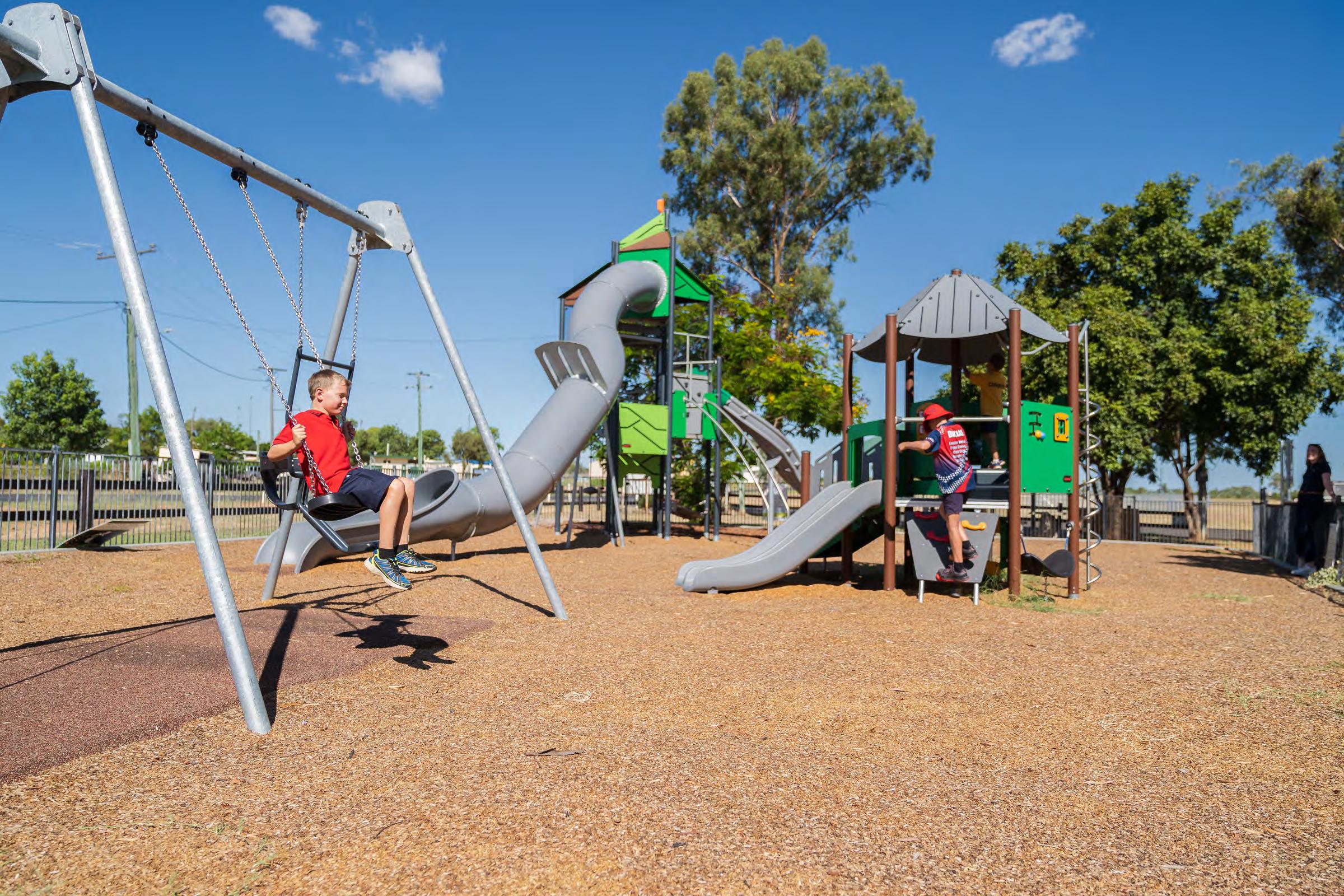

Community representation Strategic decision making Advocacy
Economic development (business facilitation, agribusiness, regional development)
Visitor economy (industry development, visitor information centres)
Customer service
Emerald saleyards
Emerald airport Governance, property and information management
Information
communication and technology (IT solutions, corporate applications)
People and culture (recruitment, payroll, learning and development)
Safety and wellness
Executive services
Strategic project advisory
Financial services (management accounting, rates and revenue)
Strategic contracts and procurement
COMMUNITIES
Connected communities (arts and engagement, community development, libraries, youth and indigenous support)
Parks and recreation (cemeteries, community facilities, sport and recreation, parks and gardens )
Disaster management (emergency management, community resilience, flood mitigation)
Planning and land management (development planning, building and plumbing, strategic land use, ranger services)
Public relations and events
Resource recovery and environmental health (waste management)
Support services (finance, human resources, events, research, communications, collateral and admin.
INFRASTRUCTURE AND UTILITIES
Fleet, workshops and depots
Infrastructure (road construction, road corridor management, road maintenance, footpaths, bridge and drain maintenance, natural resourcesgravel extraction)
Project management office
Water and sewerage utilities
COMMERCIAL AND CORPORATE SERVICES OFFICE OF THE CHIEF FINANCIAL OFFICER OFFICE OF THE CHIEF EXECUTIVE OFFICER
These goals respond to our opportunities and challenges and represent what we ultimately want to achieve over the long-term. They may well extend beyond the life of this five-year plan and articulate where we want to end up, or our ‘destination’.
Deliver, enable and advocate for reliable services to our community
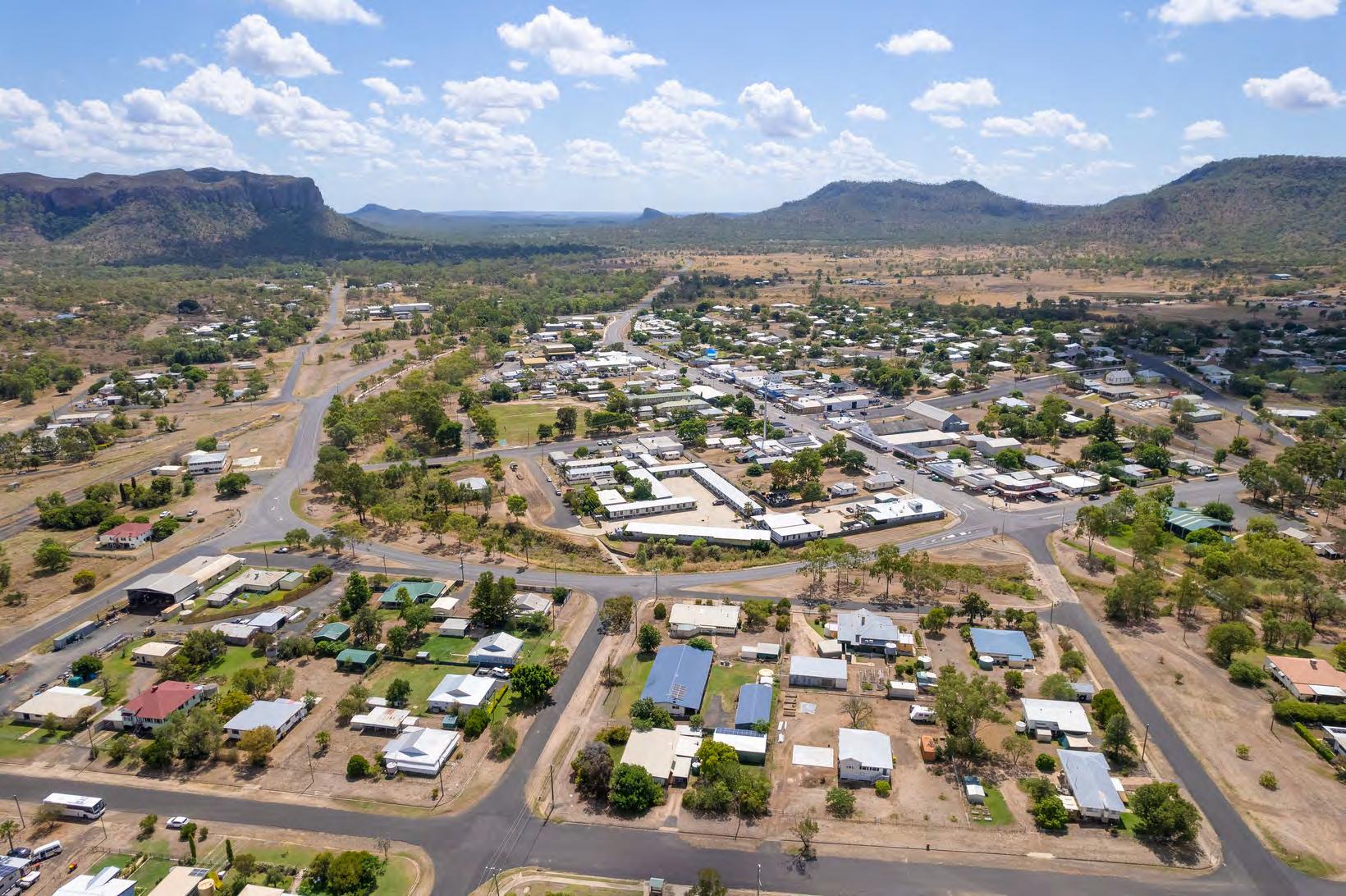
Drive our council and the region towards a digital future
Develop a future-focused workforce to support council and our region
Protect and grow a diverse and prosperous economy
Responsibly manage our natural environment
Support and enhance resilient, safe, vibrant and inclusive communities
Prepare for a low carbon future and adapt to a changing climate
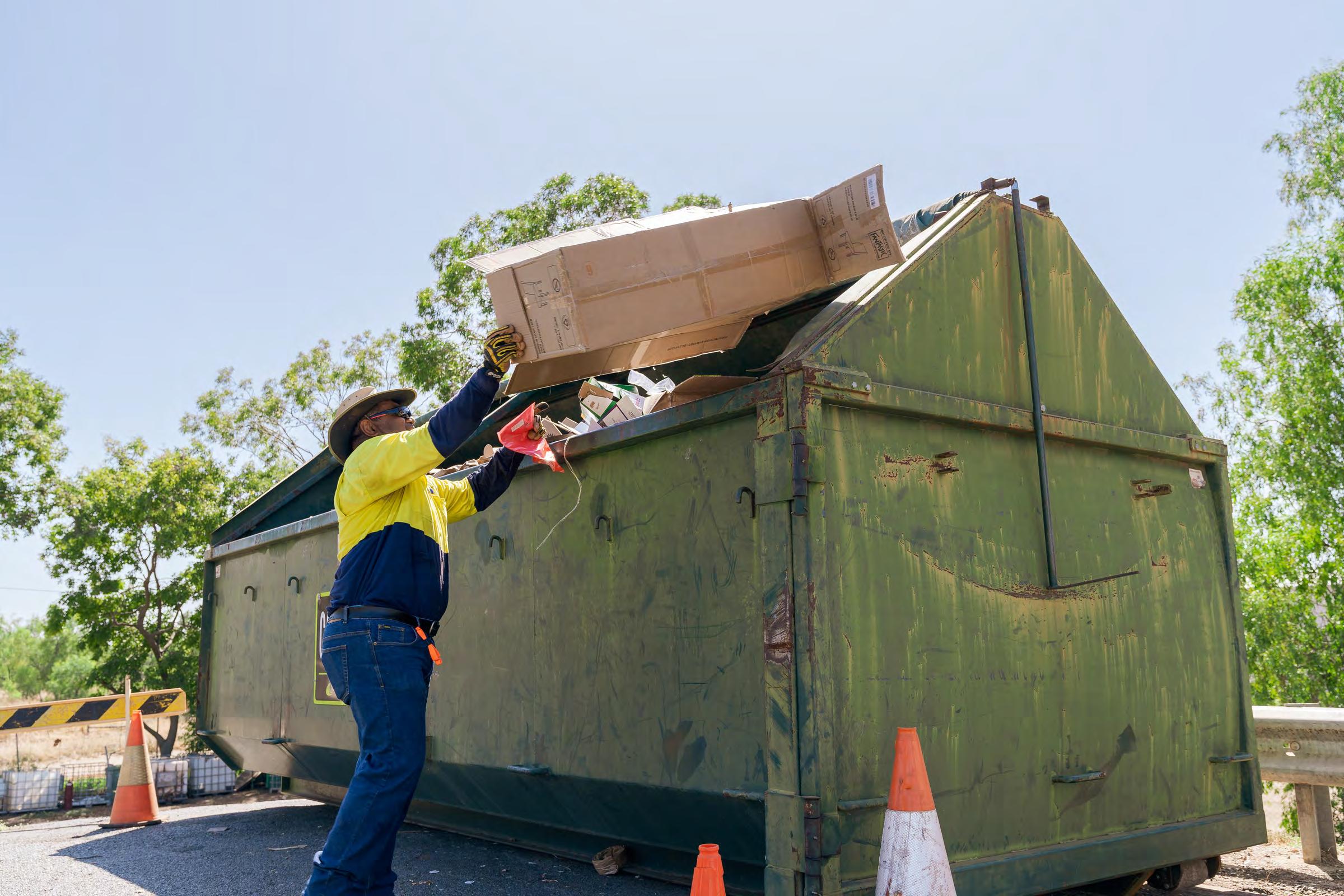
Council recognises risk management as an essential part of our daily activities and processes. It allows us to achieve an appropriate balance between realising opportunities while minimizing losses. Council is committed to an effective program of risk management and recognises its importance as an ongoing process underpinning all our activities.
The operational planning process includes the management of council's strategic and operational risks. Council's commitment to risk management is outlined in the Enterprise Risk Management Framework and the Risk Management Policy. Implementation of the Operational Plan will be undertaken in accordance with the Enterprise Risk Management Procedure.
The following corporate risks have been identified as having the potential to impact our ability to deliver core services of our business:
Financial sustainability - (source: Corporate Risk Register)
Cyber security - (source: JLT Public Secor Risk Report 2022)
Assets and infrastructure - (source: JLT Public Sector Risk Report 2022)
Business continuity - (source: Corporate Risk Register)
Disaster and catastrophe - (source: Corporate Risk Register)
Climate change - (source: Corporate Risk Register)
Workforce Safety & Wellbeing - (Self Insurance Audit 2022)
Human Resource management - (source: JLT Public Sector Risk Report 2022)
Waste management - (source: JLT Public Sector Risk Report 2022)
STRATEGIC AND CORPORATE RISKS
Benefits of risk management
Review and update corporate risk register
Risk controls and assurance testing
RISK PROFILE
Risk tolerance
Risk appetite
Risk impact
Risk levels and escalation protocols
ENTERPRISE RISK MANAGEMENT (ERM) FRAMEWORK
Revised risk profile informs development of:
Risk appetite statements
ERM framework
Reporting and communicating plan
Risk maturity plan
Aids to advance council's ERM maturity
Statutory and regulatory requirements - (source JLT Public Sector Risk Report 2022)
Strength of governance framework - (source: Corporate Risk Register)
Strategic direction execution - (source: Corporate Risk Register
Advocacy/Stakeholder Relationships - (source: Corporate Risk Register)
Water quality and supply - (source: Corporate Risk Register)
Integrated Business Systems (Technology use and change) - (source: Coporate Risk Register)
Council implements actions and mitigations to reduce our risk and utilises risk-aware decisionmaking to inform focused objectives and delivery of services to our community.
Council's Corporate Plan 2022-2027 sets the direction and priorities of our organisation, identifying expectations that the community desires within the Central Highlands and what council will do to achieve these. Services and projects conducted by council are established based on the goals and outcomes identified in the corporate plan.
The Operational Plan 2023-2024 is a one-year plan that summarises the planned actions for achieving the corporate plan goals and outcomes by delivering services to the community.
CORPORATE
Both the corporate plan and operational plan are part of council's broader corporate planning, performance and reporting framework. The framework has been created to assist elected members and council staff to make effective decisions on behalf of our community. It connects our community's vision for the Central Highlands with our services. The framework helps us identify the plans and strategies we need to develop and deliver to achieve this vision. We then align and integrate priorities to determine what to do and when, to deliver the vision.
Community Long-Term Vision Sets the long-term vision and priorities for the Central Highlands community.
Macro Trends and Drivers
Central Highlands Economic Master Plan (30 years) and Action Plan (5 years)
Corporate Plan
Sets council’s strategic direction for five years towards long-term destination goals for the Central Highlands community.
ANNUAL REPORTING
Annual Operational Plan and Capital Works Program
Key projects and activities to deliver council’s corporate plan.
QUARTERLY PERFORMANCE REPORTING
Annual Budget
Annual Business Plans/ Individual Performance Plans
Committed services and activites to deliver council’s strategic direction.
Key strategies and resourcing to achieve long-term goals.
Medium-term (5+ years)
Strategies and Resource Planning
Identifies how council will sustainably manage its assets for 10+ years.
Strategic Asset Management Plan
Forecasts options to sustainably fund infrastructure and services for 10+ years.
Long-Term Financial Plan
Community Outcomes
Inclusive, prosperous and connected Central Highlands community.
Annual Report and Community Scorecard
Provides performance information against priorities, service delivery commitments and budget as set out in the corporate and operational plans.
Central Highlands Regional Council Operational Plan 2023-2024
Measurement and reporting occurs throughout all stages of the corporate planning, performance and reporting framework. Regular measurement of performance is fundamental to the implementation of the operational plan and budget. Performance and progress is tracked and reported in 4 key documents listed below:
For the duration of the Corporate Plan 2022-2027, council will develop five annual operational plans. These plans will highlight initiatives that enable the incremental implementation of the corporate plan. Council's annual budget is aligned to the operational plan and incorporates a program of capital works to help progress towards the corporate plan's long-term destination goals.
Each month a financial report is presented to council that compares the financial results for the year-to-date to the annual budget and latest available forecast. The report also includes information about outstanding rates balances, and the presentation of financial sustainability ratios calculated based on year-to-date results.
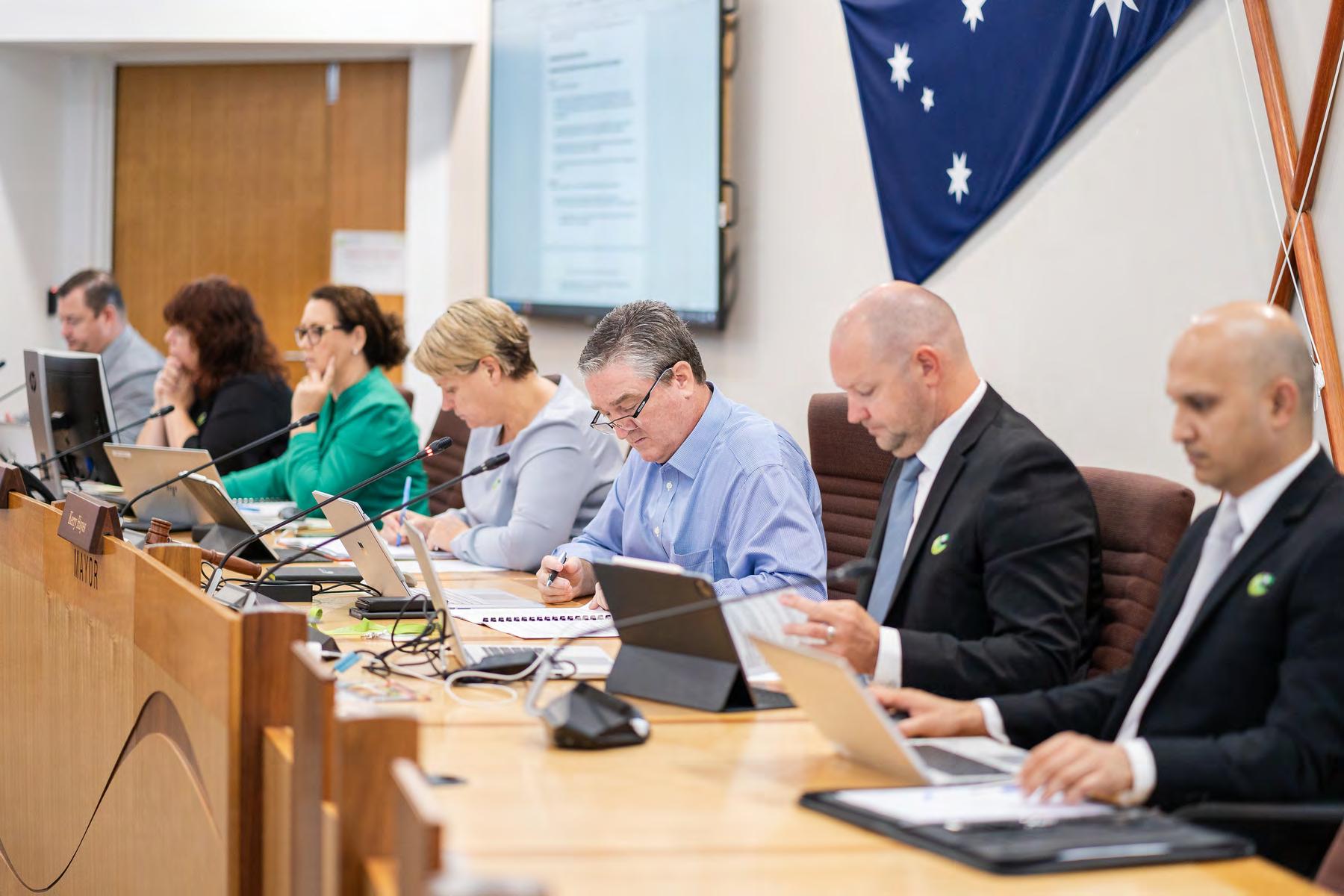
Every 3 months, a report is prepared and presented to council for adoption. Quarterly reports enable ongoing tracking of actual performance against the initiatives within the operational plan. We also include data and highlights demonstrating achievements over the quarter.
At the end of each financial year, council produces an annual report that reviews performance, achievements and challenges. The annual report provides our community with operational and financial information that demonstrates council's performance against goals, outcomes and objectives set out in the corporate and operational plans.
Council delivers major initiatives (MI) which are unique 'one-off' projects aimed at delivering a specific output and require collaboration across multiple departments or business units to deliver. Council also delivers core services to both internal and external stakeholders to support an inclusive, prosperous and connected regional community. In addition to the major initiative (MI) and core services being delivered, council's Executive Leadership Team has committed to council delivering 12 executive-led projects broken into two groups:
Strategic Projects (SP) - projects based on council's strategic risk register and audit outcomes. Enabling Projects (EP) - projects identified to enable improved quality, reduced-risk delivery or future improvements.
More information on council's SP, EP, MI and core services is provided in Appendix 1 starting from page 28.
Full organisational safety review with a focus on improved behaviour and culture
Financial Sustainability Strategy Chief Financial Officer
Defining and addressing council's long-term financial challenges
Asset Management Plans (AMPs)
General Manager Infrastructure and Utilities
Programmed improvements to council AMPs integrated with council's budgeting process
Towards Net Zero 5year Action Plan
General Manager Communities
Reducing emissions of and safeguarding the environment from council's operations
Cyber Security
General Manager
Corporate and Commercial Services
Implementation of council's cyber security initiatives
Central Highlands Economic Master Plan Action Plan Renewal
Central Highlands Development Corporation Chief Executive Officer
Delivery of the Central Highlands Economic Master Plan Action Plan Renewal 2023-2028
Service Catalogue and Internal Services Review
General Manager Corporate and Commercial Services
Describing council's services, current service levels and cost of delivery and improving how internal services enable delivery of council's services
Project Management Office Capital Delivery
General Manager Infrastructure and Utilities
Supporting delivery and monitoring of council's capital program
Procurement Business Model Review
Chief Financial Officer
Supporting the business in the delivery of procurement activities of council's operations
Advocacy Strategy Implementation
Chief Executive Officer
Determining council's advocacy priorities and implementing the Advocacy Strategy and Action Plan
Community Engagement Framework Project

General Manager Communities
Support implementation of new community engagement framework including engagement on operational projects
Workforce Development Program
Central Highlands Development Corporation Chief Executive Officer
Investigating a workforce development program that incorporates workforce attraction, skills, training and enabling services
Aged Asset Demolitions
General Manager Communities
Asset Module Improvements
General Manager Infrastructure and Utilities
Planned Maintenance Project
General Manager Infrastructure and Utilities
Permanent Maintenance Scheduler Utilities
General Manager Infrastructure and Utilities
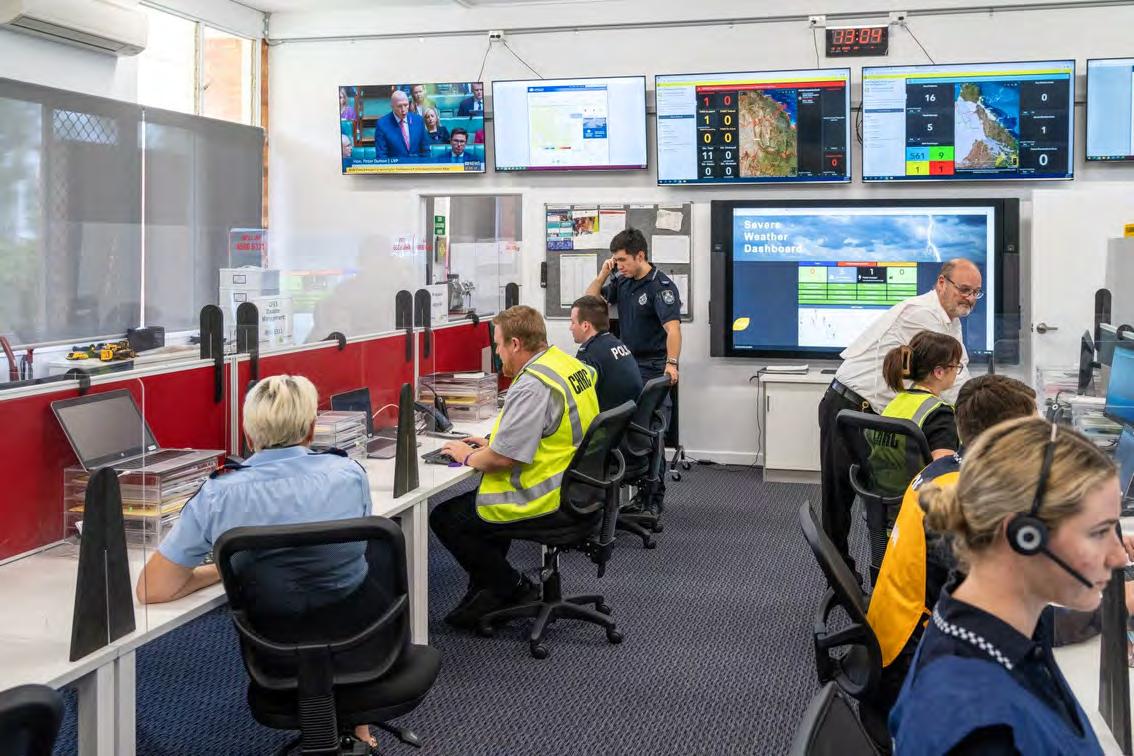
Regional Tourism Organisation Transition
Central Highlands Development Corporation
General Manager Communities
Economic Stimulus Policy
Industrial, Commercial and Residential Land Study
General Manager Communities
MI8
General Manager Communities Emerald Flood Evacuation Community Engagement
MI9 MI10 MI11 MI12 MI13 MI14
Community Visioning Project
General Manager Communities
Volunteer Recognition Walks
General Manager Communities
Person to Control Electrical Work (PCEW) Contract Position
General Manager Commercial and Corporate Services
Website Initiative Project
Desludging Project
General Manager Communities
General Manager Infrastructure and Utilities
Trade Waste Policy and Management Plan
Regional Transition and Transformation Planning
chrc.qld.gov.au
General Manager Communities
General Manager Communities MI15 MI16
Chief Executive Officer
Deliver, enable and advocate for reliable services to our community
Financial Sustainability Strategy (SP2)
Asset Management Plans (SP3)
Services Catalogues and Internal Services Review (EP1)
Project Management Office Capital Delivery (EP2)
Procurement Business Model Review (EP3)
Advocacy strategy Implementation (EP4)
Aged Asset demolitions (MI1)
Asset Module Improvements (MI2)
Planned Maintenance Project (MI3) & Permanent Maintenance Scheduler Utilities (MI4)
Protect and grow a diverse and prosperous economy
Central Highlands Economic Master Plan Renewal (SP6)
Regional Tourism Organisation Transition (MI5)
Economic stimulus policy (MI6)
Industrial, Commercial and Residential Land Study (MI7)
Support and enhance resilient, safe, vibrant and inclusive communities
Advocate for Flood Warning Network and Flood Mitigation Projects Funding (EP4)
Community Engagement Framework (EP5)
Emerald Flood Evacuation Community Engagement (MI8)
Community Visioning Project (MI9)
Volunteer Recognition Walks (MI10)
PCEW Contract Position (MI11)
Drive our council and the region towards a digital future
Cyber security initiatives (SP5)
Advocate for Infrastructure and Service Improvements in Digital Connectivity (EP4)
Website Initiative Project (MI12)
Develop a futurefocused workforce to support council and our region
Safety first (SP1)
Regional Workforce Development Program (EP6)
Responsibly manage our natural environment
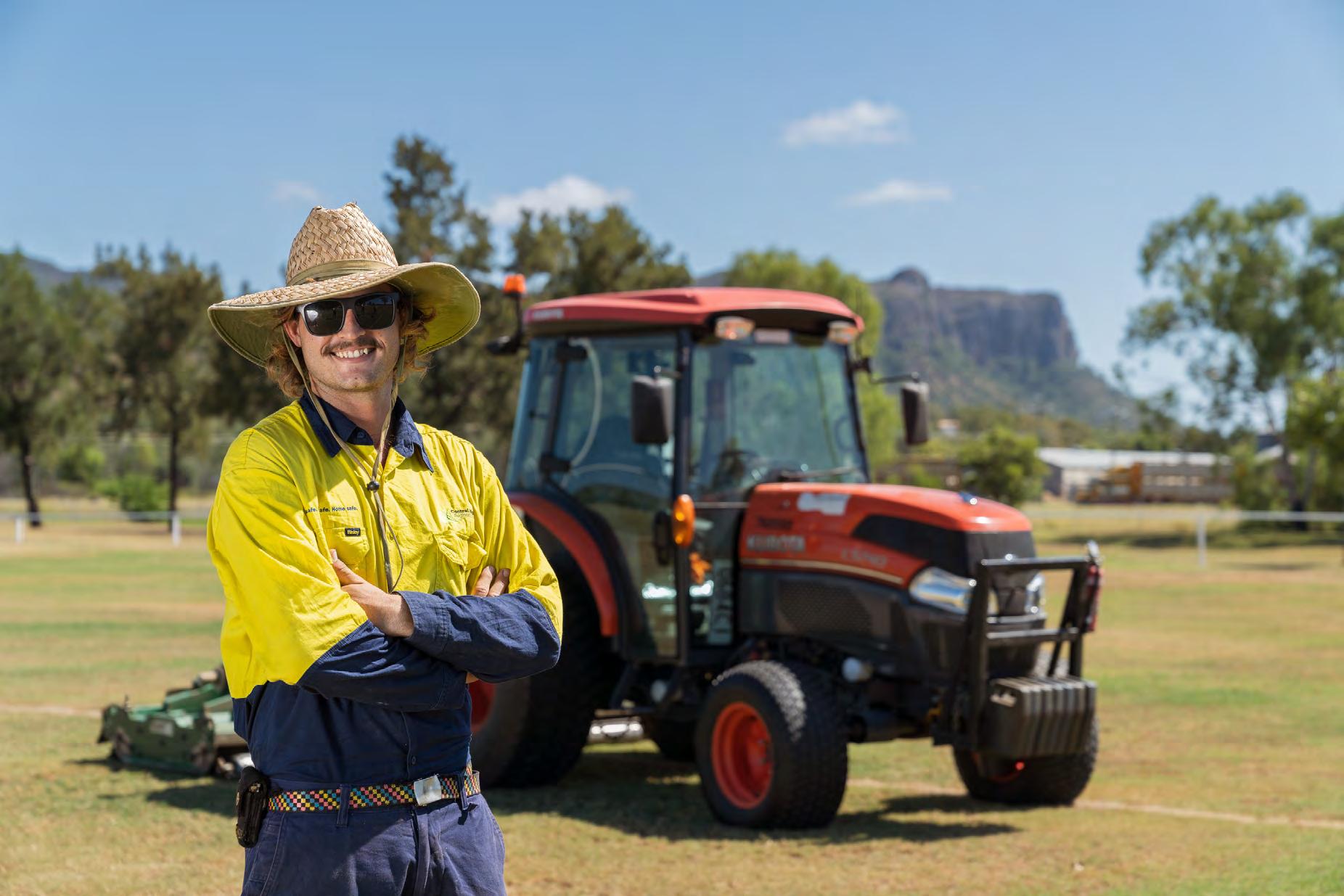
Desludging project (MI13)
Revocation of Blackwater Priority Development Areas (MI14)
Trade Waste Policy and Management Plan (MI15)
Council delivers core services to internal and external stakeholders to support an inclusive, prosperous and connected regional community. Council business units deliver multiple core services which contribute to delivering council's long-term destination goals. These core services have been organised by the goal they deliver towards in our corporate plan.

1 2 3
Protect and grow a prosperous economy
Support and enhance resilient, safe, vibrant and inclusive communities
Building planning and Aquatic facilities
Cemetery services
Community development
Community facility
maintenance
Community services
management
Emergency services
Libraries
Marketing and communications
Public health
Planning
Sporting facilities
Drive
and
Information communication and technology
a
Executive management
Financial services
Governance and legal
Housing and property services
Human resources
Rates and revenue operations
Safety initiatives
Workplace health & safety
manage our natural environment
Land management
Parks and open space management
Ranger services
Strategic planning
for a low carbon future and adapt to a changing climate
Advocacy (as part of administrative services)
Fleet services
In delivering council's core services, business units also action initiatives from council's strategies which support the delivery of council's long-term destination goals.
To recognise, support and celebrate the partnerships between arts and cultural groups, community and government in the common goal of strategic and innovative arts and cultural services.
To improve how council engages with the community to achieve effective, inclusive engagement.
To overcome digital infrastructure limitations in addressing challenges facing the region and harnessing opportunities technology has to offer with a focus on reliable fixed internet and mobile connectivity, emergency communications resilience, community safety and asset security, digital and connectivity literacy and decarbonisation.
To provide a framework for managing flying foxes within the Central Highlands region. The plan draws on scientific literature and other relevant knowledge about flying fox ecology and management.
To deliver inclusive library events, programs and services to the community and visitors to the region.
To facilitate the implementation of effective and efficient disaster management strategies and arrangements in line with the Queensland Prevention. Preparedness, Response, and Recovery Disaster Management Guidelines, the Queensland Climate Adaptation Strategy, and the Queensland Strategy for Disaster Resilience.
To provide for the sustainable coordination, management and growth of the recreational vehicle, caravan and camping sector in the Central Highlands.
To ensure that Central Highlanders are respectful of the tradition and culture of its Aboriginal and Torres Strait Islander community and develop respectful, meaningful relationships and sustainable opportunities to improve socioeconomic outcomes for Aboriginal and Torres Strait Islander people in the Central Highlands.
To facilitate participation in sport and recreation across the region by providing innovative recommendations to help guide effective, sustainable, and well-informed decision-making for the future of sports facilities and open space provision in the region.
To provide a strategy on how best to manage our water sources and secure additional water for the region.
To deliver youth development programs regionally to ensure young people are given opportunities to be engaged and informed within their communities.
To drive economic opportunities to support the Central Highlands as a dynamic inland region of choice.
Deliver, enable and advocate for reliable services to our community
Protect and grow a diverse and prosperous economy
Support and enhance resilient, safe, vibrant and inclusive communities
Drive our council and the region towards a digital future
Develop a future-focused workforce to support council and our region
Responsibly manage our natural environment
Prepare for a low carbon future and adapt to a changing climate
$4.44 per week
Average residential rates and changes rise after 5% prompt payment discount.
$292.4 M
New for 2023-2024
$17.2 M
continuing from 2022-2023
capital works program
$509,752
community support
Grants programs, concessions, sponsorships and donations
$56.05
total operational budget
Maintenance of 5,163 km of council roads
total budget $41.9 M roads $324,841
community development
Youth services, indigenous support, community wellbeing
$6.1M
parks and open spaces
Capital renewal, upgrades and new projects
$2.2 M
arts, culture and libraries
Cultural events and workshops, art galleries, library services, heritage
$8.2 M
our organisation
Attraction and retention, skill training and development, workplace health and safety
$186.5 M 10% rates capping $28.5
per annum after 5% discount
average increase in residential water access charges
Residential, commerical and rural
per annum after 5% discount
average increase in residential waste charges
$22.9 M
critical water and sewerage asset investments
Capital renewal, upgrade and new
$80.8 M $19.2 M
natural environment
Investment in sustainable energy, environmental works, resource recovery, disaster management
$20.9 M digital future
Online council service delivery, digital technologies and initiatives, communications technology networks
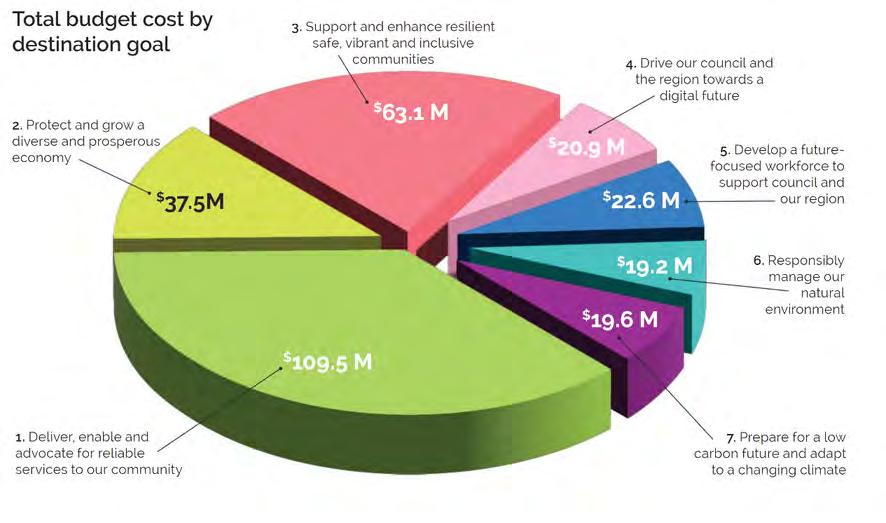
$292.4 M total investment
Operational and capital
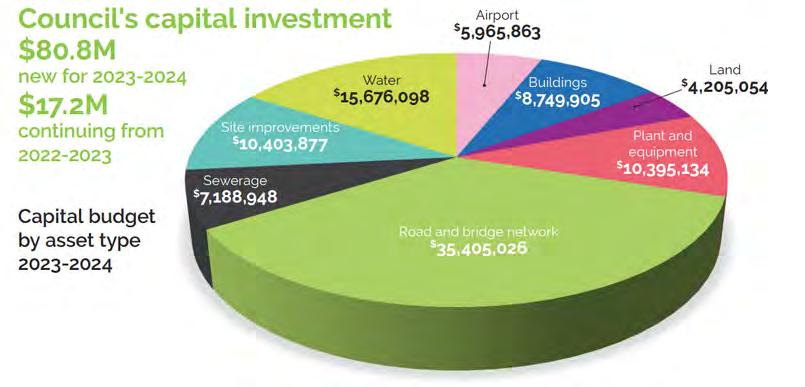
Financial Sustainability Strategy (SP2)

Initiative Defining and addressing council’s long-term financial challenges
Responsible Chief Financial Officer
Accountable Chief Financial Officer
Delivery 30 June 2024
Link to the Corporate Plan Corporate Plan Theme 6 – Council Financial Sustainability Strategy 6.4 – Deliver services, operations, and projects within a realistic long-term financial plan
Asset Management Plans (SP3)
Initiative Programmed improvements to council Asset Management Plans, linked to council budgeting
Responsible Manager Project Management Office
Accountable General Manager Infrastructure & Utilities
Delivery 30 June 2024
Link to the Corporate Plan Corporate Plan Theme 4 – Quality Infrastructure and Assets Strategy 4.4 – Review assets hierarchy, align asset management plans with service levels and operational models, and rationalise assets
Services Catalogue & Internal Services Review (EP1)
Initiative Describing council’s services, current service levels, cost of delivery and improving how internal services enable the delivery of council’s services
Responsible Manager Customer Service
Accountable General Manager Commercial and Corporate Services
Delivery 30 June 2024
Link to the Corporate Plan Corporate Plan Theme 6 – Council Financial Sustainability Strategy 6.1 – Define and promote affordable service levels across all council services
Project Management Office – Capital Delivery (EP2)
Initiative Supporting delivering and monitoring of council’s capital program
Responsible Manager Project Management Office
Accountable General Manager Infrastructure & Utilities
Delivery 30 June 2024
Link to the Corporate Plan Corporate Plan Theme 4 – Quality Infrastructure and Assets Strategy 4.1 – Enable regional industry development with appropriate transport connectivity, tourism, and services infrastructure
Procurement Business Model Review (EP3)
Initiative
Supporting the business in the delivery of procurement activities of council’s operations.
Responsible Strategic Procurement and Contracts Manager
Accountable Chief Financial Officer
Delivery 30 June 2024
Link to the Corporate Plan Corporate Plan Theme 1 – Governance, Leadership and Capability Strategy 1.1 – Embed responsible governance, accountabilities, and performance within council
Advocacy Strategy Implementation (EP4)
Initiative Determine council’s advocacy priorities and implement advocacy strategies for each long-term destination goal.
Responsible Chief Executive Officer
Accountable Chief Executive Officer
Delivery 30 June 2024
Link to the Corporate Plan Corporate Plan Theme 1 – Governance, Leadership and Capability Strategy 1.6 – Improve strategic advocacy for council services and provide value to all stakeholders
Aged Asset Demolitions (MI1)
Initiative

Continue demolition works on aged assets within the region including amenities and toilets, sporting infrastructure, assets in parks and community facilities that will not be replaced.
Responsible Manager Parks and Recreation
Accountable General Manager Communities
Delivery 30 June 2027
Link to the Corporate Plan
Asset Module Improvements (MI2)
Corporate Plan Theme 4 – Quality infrastructure and assets Strategy 4.4 – Review assets hierarchy, align asset management plans with service levels and operational models and rationalise assets
Initiative Investigate which asset register and management system will provide the most benefit to council as an entire organisation
Responsible Manager Project Management Office
Accountable General Manager Infrastructure & Utilities
Delivery 30 June 2024
Link to the Corporate Plan
Corporate Plan Theme 4 – Quality infrastructure and assets Strategy 4.4 – Review assets hierarchy, align asset management plans with service levels and operational models and rationalise assets
Planned Maintenance Project (MI3) and Permanent Maintenance Scheduler Utilities (MI4)
Initiative Configure council’s maintenance system for the business unit to enable maintenance planning and scheduling to be captured within the system and enable automatic generation of planned maintenance schedules
Responsible Manager Water Utilities
Accountable General Manager Infrastructure & Utilities
Delivery 30 June 2024 and 30 June 2025
Link to the Corporate Plan
Corporate Plan Theme 4 – Quality infrastructure and assets Strategy 4.2 – Implement environmentally sustainable and secure town water strategies
Core Services
Administrative support services

Airports
Contributes to the sustainability of the organisation through the delivery of administrative, office and executive support services whilst being effective and responsive to management and organisational requirements.
Maintains and operates council’s airports and aircraft landing areas connecting visitors and neighbours to our region.
Asset management Supports the creation of a strong asset management culture in council with the responsibility for the asset register, geo-spatial representation, internal project plan and asset management.
Customer service
Depot and workshop operations
Elected representatives
Infrastructure management and technical services
Responds to customer demand, improves customer experience, manages correspondence and emails while also offering choice of communication, such as online transactions, to support customer access to council.
Maintains and repairs council’s fleet to ensure council remains operational and delivers quality services and infrastructure.
Provides assistance to councillors in implementing the strategic direction of the organisation.
Solves engineering challenges by developing for purpose and innovative solutions. This area of the organisation is also responsible for:
• Bridges, culverts & footpaths
Project management Understands what the region’s infrastructure needs, risks and opportunities are to allow council to sustainably provide service to our community.
Records management Manages council’s records including the retention and disposal of documents. Provides training to the organisation on records management.
Roads network management and maintenance
Builds and maintains our road transport infrastructure. This area is also responsible for:
• Road Maintenance Performance Contract (RMPC)
Saleyards Investigates, plans, advocates and develops strategic project initiatives that will enhance the prosperity and liveability of the Central Highlands Region.
Sewerage Builds, operates and maintains our sewerage infrastructure to meet our environmental obligations.
Water supply Builds, operates and maintains our sewerage and water infrastructure to deliver safe drinking water.
Central Highlands Economic Master Plan Action Plan Renewal (SP6)
Initiative Deliver the Central Highlands Economic Master Plan Action Plan Renewal 2023-2028
Responsible Central Highlands Development Corporation Chief Executive Officer
Accountable Central Highlands Development Corporation Chief Executive Officer
Delivery 30 September 2023
Link to the Corporate Plan
Corporate Plan Theme 2 – Regional economic prosperity Strategy 2.1 – Support regional industry development via advocacy, planning and incentives CHDC Corporate Strategy Priority 6 – Strategy and Planning; Objective 6.1 – Lead, monitor and report on the economic development strategy for the region.
Regional Tourism Organisation Transition (MI5)
Initiative
Facilitate the transition of Central Highlands to Queensland Outback regional tourism organisation
Responsible CHDC Chief Executive Officer
Accountable CHDC Chief Executive Officer
Delivery 30 June 2024
Link to the Corporate Plan
Economic Stimulus Policy (MI6)
Corporate Plan Theme 2 – Regional economic prosperity Strategy 2.2 – Facilitate new tourism and liveability opportunities with quality cultural facilities, improved access and attraction of events
Initiative Continued Implementation of the economic stimulus policy to enable financial assistance to support the revitalisation of urban areas and attract and retain business investment in the region
Responsible Manager Planning and Environment
Accountable General Manager Communities
Delivery 30 June 2024
Link to the Corporate Plan
Corporate Plan Theme 2 – Regional economic prosperity Strategy 2.1 – Support regional industry development via advocacy, planning and incentives

Industrial, Commercial and Residential Land Study (MI7)
Undertake an industrial, commercial and residential land study to:
• Establish the future demands for land (greenfield and infill) for housing, business and industry and identify the minimum requirement to support the development of the Central Highlands region over the next 15 years.
Initiative
• Gauge suitability or otherwise of the existing and planned land zoned to support industry, commercial and residential uses (including affordable housing options) and whether it can accommodate that growth.
• Identify suitable areas for rezoning to ensure council provides sufficient land zoned to support population growth, job creation, business expansion and attraction that is appropriate for the region.
• Inform strategic planning decisions relating to rezoning, Local Government Infrastructure Plan (LGIP) and future amendments.
Responsible Manager Planning and Environment
Accountable General Manager Communities
Delivery
Link to the Corporate Plan
Core Services
Building planning and development
30 June 2024
Corporate Plan Theme 2 – Regional economic prosperity Strategy 2.1 - Support regional industry development via advocacy, planning and incentives
Economic development
Provides advice and regulates development under several legislative frameworks and statutory assessment frameworks.
Facilitates sustainable, financially and environmentally responsible initiatives that will advance economic development in the Central Highlands Region.
This area is also responsible for:
• Agribusiness Development
• Business Networking & Events
• Business Support
• Destination Management
• Economic Strategy and Engagement
• Investment Attraction
• Regional Economic Data and Information
• Tourism Development
Strategic procurement and contracts
Visitor economy
Supports safe, efficient, sustainable and timely delivery of council’s operational program of work through effective procurement management in accordance with legislative obligations.
Tourism development and visitor information centres.

Flood Warning Network and Flood Mitigation (EP4)
Initiative
Advocate for funding for the flood warning network across the region; and advocate for funding of flood mitigation projects in Rolleston, Bluff, Emerald and Gemfields on a priority basis.
Responsible Flood Mitigation Project Manager
Accountable General Manager Communities
Delivery 30 June 2024
Link to the Corporate Plan Corporate Plan Theme 3 – Community Wellbeing Strategy 3.5 – Collaborate with communities to support local area resilience uniqueness and sustainability.
Community Engagement Framework Project (EP5)
Initiative
Review existing community and stakeholder engagement practices to inform the development of an updated Community Engagement Policy and Action Plan. Implement the Community Engagement Action.
Responsible Connected Communities Lead
Accountable General Manager Communities
Delivery 30 June 2024
Link to the Corporate Plan Corporate Plan Theme 3 – Community Wellbeing Strategy 3.2 – Review methods and practices for community and stakeholder engagement
Emerald Flood Evacuation Community Engagement (MI8)
Initiative Undertake a planned strategic information-sharing and education process with the Emerald community around flood risk and emergency action needs.
Responsible Flood Mitigation Projects Manager
Accountable General Manager Communities
Delivery 30 June 2024
Link to the Corporate Plan Corporate Plan Theme 3 – Community Wellbeing Strategy 3.5 – Collaborate with communities to support local area resilience, uniqueness and sustainability
Community Visioning Project (MI9)
Initiative To refresh council’s understanding of what is important to communities through the region and identify the vision, priorities and aspirations for the next 20 years.
Responsible Connected Communities Lead

Accountable General Manager Communities
Delivery 31 December 2023
Link to the Corporate Plan Corporate Plan Theme 3 – Community Wellbeing Strategy 3.1 – Undertake long-term regional and community-based visioning
Volunteer Recognition Walks (MI10)
Initiative
Recognising volunteers from our region with the installation of plaques in a park in each of our townships.
Responsible Manager Parks and Recreation

Accountable General Manager Communities
Delivery 30 June 2024
Link to the Corporate Plan Corporate Plan Theme 3 – Community Wellbeing Strategy 3.7 – Protect and promote the heritage of our region
Initiative Continuing a PCEW contract position in council to oversee electrical audit and rectifications.
Responsible Manager Safety and Wellness
Accountable General Manager Commercial and Corporate Services
Delivery 30 June 2024
Link to the Corporate Plan Corporate Plan Theme 4 – Quality Infrastructure Strategy 4.4 – Review assets hierarchy, align asset management plans with service levels and operational models and rationalise assets
Core Services
Aquatic facilities
Cemetery Services
Making available to the community aquatic facilities across the region.
Providing burial and internment services across the region in well-maintained spaces.
Works alongside the community and council employees to create the conditions for community-led development, resilience and capacity, providing opportunities for the people in our region to be actively engaged.
This area is also responsible for:
• Art Galleries
Community development
• Community Engagement
• Community Grants
• Indigenous Cultural Support
• Youth Development
Community facility maintenance Manages and maintains quality corporate and community facilities across the region including workplaces, small halls and major venues.
Community services management Community events and activities are public gatherings designed bring people together for a common purpose, creating opportunity to build community connection and cohesion.
Coordination of state emergency services and disaster operations in the Central Highlands ensures a comprehensive, all hazards, all agency approach by achieving the right balance of prevention, preparedness, response and recovery, aligning disaster risk reduction, disaster mitigation, disaster resilience and climate change adaptation policy, strategies and actions with international and national reforms.
Emergency services
This area is also responsible for:
• Flood Mitigation
• Hazard Reduction
Libraries Engages with our community through the delivery of welcoming and dynamic spaces, programs, and collections.
PCEW Contract position (MI11)Marketing and communication
Works together using a range of skills to expertly service the businesses’ needs based on experience using communication methods and channels offering a range of internal and external services to the organisation.
Public health Provides education, awareness, compliance and enforcement of all relevant legislation for the community, including developing and delivering programs at events, in schools, field days and upon request.

Sporting facilities
Partnering with the community and sporting organisations to deliver quality facilities and promote active recreation.
Cyber Security Initiatives (SP5)
Initiative Implementing council’s cyber security strategy and initiatives
Responsible Manager Information Communications and Technology
Accountable General Manager Commercial and Corporate Services
Delivery 30 June 2024
Link to the Corporate Plan Corporate Plan Theme 4 – Quality Infrastructure and Assets Strategy 4.5 – Advocate for regional digital connectivity infrastructure and services
Infrastructure & Service Improvements in Digital Connectivity (EP4)
Initiative Advocate for infrastructure and service improvements in digital connectivity for identified problem/gap areas.
Responsible Principal Projects Advisor
Accountable Chief Executive Officer
Delivery 30 June 2024
Link to the Corporate Plan Corporate Plan Theme 4 – Quality Infrastructure and Assets Strategy 4.5 – Advocate for regional digital connectivity infrastructure and services
Website Initiative Project (MI12)
Initiative
The migration and redesign of council’s website with usability and accessibility for the community front of mind.
Responsible Coordinator Public Relations and Events
Accountable General Manager Communities
Delivery 31 December 2024
Link to the Corporate Plan Corporate Plan Theme 4 – Quality Infrastructure and Assets Strategy 4.5 – Advocate for regional digital connectivity infrastructure and services

Core Services
Supports council in achieving its strategic outcomes by enabling our people to utilise fit-for-purpose technology and information systems to deliver our services safely and more efficiently, and to make it easier for our community to access services and information as required
Information Communication Technology (ICT)
This area is also responsible for:
• Corporate Applications
• ICT Solutions
• ICT Triage
• Information Technology
Safety First (SP5)
Initiative Full organisational safety review with a focus on behaviour and culture.
Responsible Chief Executive Officer
Accountable Chief Executive Officer
Delivery 30 June 2024
Link to the Corporate Plan Corporate Plan Theme 1 – Governance, Leadership and Capability Strategy 1.5 – Embed a safety and an environmental sustainability culture within council, its suppliers and partners.
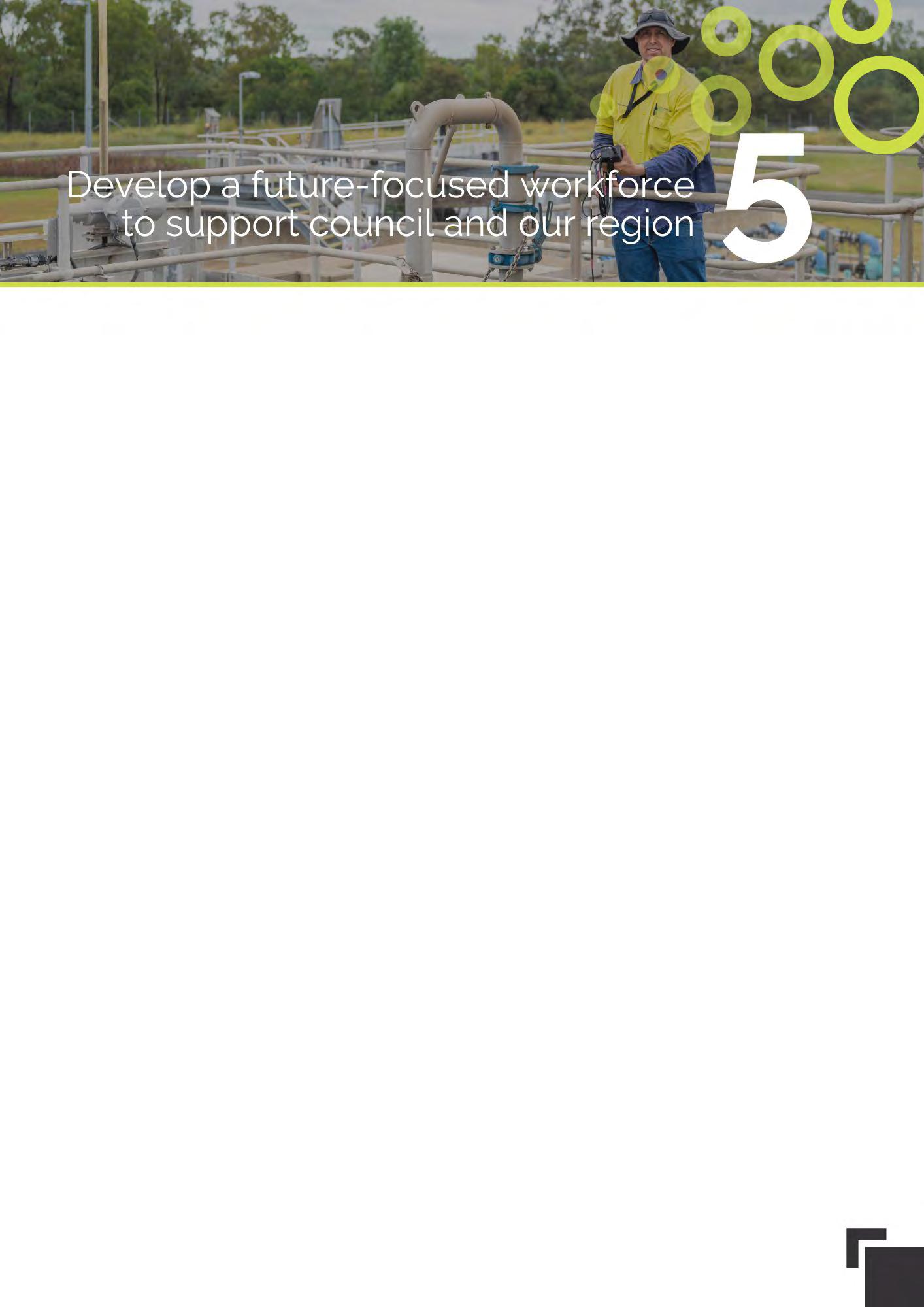
Investigate and develop in conjunction with regional employers, a workforce development program incorporating:
• workforce attraction
Initiative
• skills and training
• the development of enabling services such as housing and childcare.
Responsible Central Highlands Development Corporation Chief Executive Officer
Accountable Central Highlands Development Corporation Chief Executive Officer
Delivery 30 December 2023
Link to the Corporate Plan
Corporate Plan Theme 2 – Regional economic prosperity Strategy 2.3 – Partner to attract, retain and develop a future-focused, skills workforce across our region CHDC Corporate Strategy Priority 2 – Workforce Development; Objective 2.1 – Partner to attract, retain and develop a future focused, skills workforce across the region.
Core Services
Executive management
Provides the strategic vision and leadership to develop the future workforce to enable the organisation and community to thrive.
Provides efficient and effective accounting support to the organisation in a manner that supports and enhances the business performance of council.
Financial services
This area is also responsible for:
• Grants
• Financial Systems
• Creditors
Governance and legal
Challenges the status quo and is committed to engaging and collaborating with the business to improve processes, systems and outcomes. Ensures council achieves its objectives and drives business improvements ethically, responsibly and in accordance with statutory requirements.
Ensures properties and land owned or leased by council or over which council has an interest or management responsibility are managed in a financially sustainable way, consistent with council’s strategic goals and in the best interests of our communities, including provision for cultural heritage and Native Title advice.
House and property services
This area is also responsible for:
• Community housing
• Aged housing
• Lease Management
Partners with the organisation to develop recruitment strategies, an employer brand and employee value propositions to attract the right talent.
Human resources
This area is also responsible for:
• Industrial Relations
• Payroll
Core Services
• Recruitment
• Training and Development
Rates and revenue
Workplace health and safety
Responsible for monitoring and maximising all revenue that is payable to council. Collaborates which leaders to ensure all fees and charges are legally compliant and financially sustainable. Identifies strategic grant funding opportunities and leverages maximum benefit for the delivery of priority initiatives.
Creates a constructive safety culture to keep our employees and community safe

This area is responsible for:
• Safety Initiatives.
• Rehabilitation Health and Wellbeing
Desludging Project (MI13)
Initiative Desludge Opal Street lagoon to remain compliant with council’s environmental authority.
Responsible Manager Water Utilities
Accountable General Manager Infrastructure & Utilities
Delivery 30 June 2024
Link to the Corporate Plan Corporate Plan Theme 4 – Quality infrastructure and assets Strategy 4.2 – Implement environmentally sustainable and secure town water strategies
Revocation of Priority Development Areas (MI14)
Initiative
Progress with the revocation of all planning and development assessment activities associated with the Blackwater Priority Development Area (PDA) and Blackwater East PDA.
Responsible Manager Planning and Land Management
Accountable General Manager Communities
Delivery 30 June 2024
Link to the Corporate Plan Corporate Plan Theme 2 – Regional economic prosperity Strategy 2.4 – Streamline processes for businesses and industries working with council
Trade Waste Policy and Management Plan (MI15)
Initiative
Development of trade waste policy, management plan and parameters around reintroducing trade waste permits to our processes and systems.
Responsible Manager Resource Recovery and Environmental Health
Accountable General Manager Communities
Delivery 30 June 2024
Link to the Corporate Plan Corporate Plan Theme 5 – Natural Environment Strategy 5.2 – Develop and implement resource recovery (waste) strategies to support a circular economy

Core Services
Land management
Parks and open space management
Ranger services
Strategic planning
Works with the community by developing and implementing strategies, plans and programs to ensure our activities protect the environment, prevent or minimise harm, preserve biodiversity values and adopt to climate risks securing our region’s sustainability into the future.
Maintain the parks, reserves and open spaces across the region to provide safe recreational areas
Provides education and regulation for the community to encourage responsible pet ownership and, where appropriate, enforce animal management legislation.
This area of the organisation is also responsible for:
• Pest and weed control
• Rural land management
Partners with the organisation to identify future land uses and associated planning scheme amendments to unlock the future potential of the region.
Initiative
Reducing emissions of and safeguarding the environment from council’s operations.
Responsible General Manager Communities
Accountable General Manager Communities
Delivery 30 June 2024
Link to the Corporate Plan Corporate Plan Theme 5 – Natural Environment Strategy 5.1 – Develop, implement and promote council’s net zero emissions actions and targets
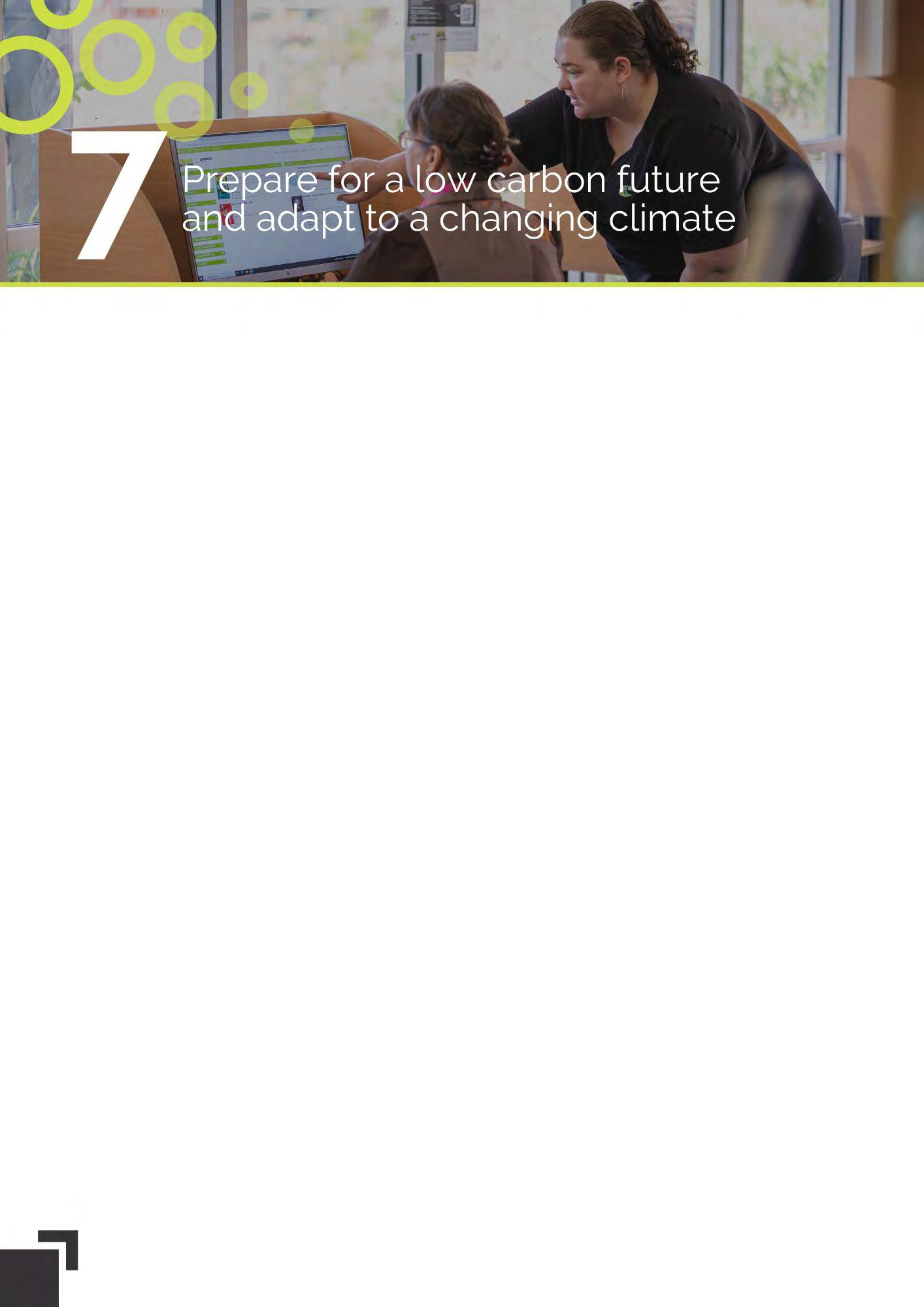
Initiative
Work with CQROC and Bowen Basin councils to research, recommend and advocate for the establishment of an inter-governmental economic transition model planning for the Bowen Basin / Central Queensland region.
Responsible Principal Projects Advisor
Accountable Chief Executive Officer
Delivery 30 June 2024
Link to the Corporate Plan Corporate Plan Theme 5 – Natural Environment Strategy 5.3 – Lead and advocate for resourcing to support the broader region to prepare for a transition to a lower carbon future
Core Services
Fleet services
Waste services
Partners with the organisation to manage council’s fleet and identify opportunities to reduce emissions from council’s fleet.
Collects and disposes of solid and liquid wastes, operates waste transfer facilities and landfills, recycling and materials recovery, and community education programs.
This area of the organisation is also responsible for:
• Environmental Health
